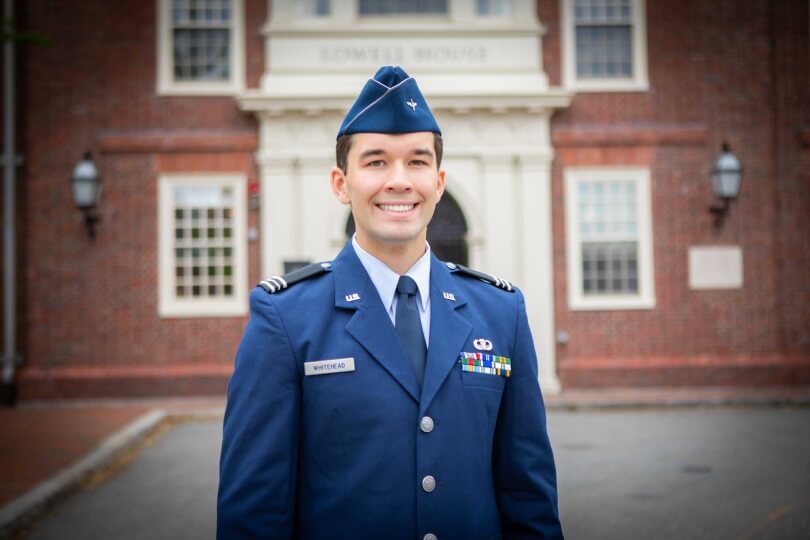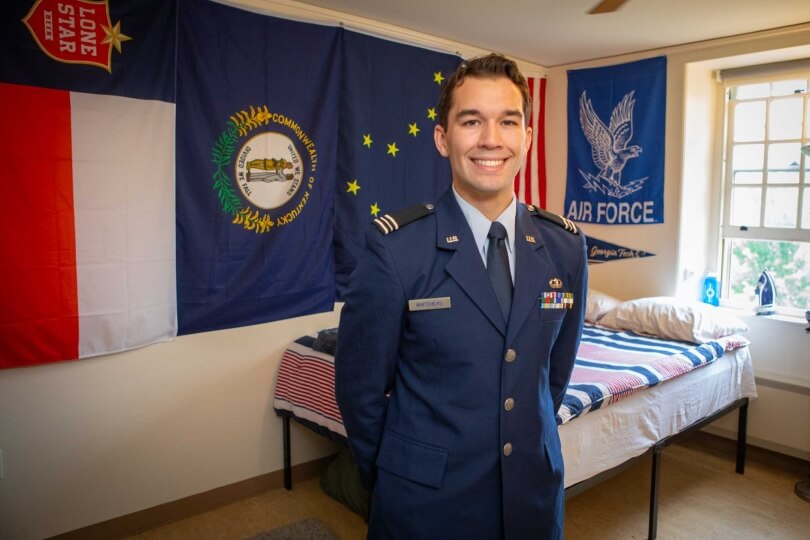Charles "Trey" Whitehead, A.B. '25, in applied mathematics (Eliza Grinnell/SEAS)
As a homeschool student in a small farming town in Alaska, Charles “Trey” Whitehead had to teach himself about calculus from preparatory books for the Advanced Placement exam. This process made him fall in love with math and problem solving. As he transitioned to the Groton School, a private boarding school in northeastern Massachusetts, he continued to develop that interest in mathematics.
Once it came time to pick a college, the applied math curriculum at the Harvard John A. Paulson School of Engineering and Applied Sciences (SEAS) immediately drew his attention.
“Applied math at its core is problem solving, and where you apply that problem solving is only limited by your own aspirations,” he said. “It was the applied math advisors that I reached out to after I got into Harvard that really sold me on the program and its flexibility as a liberal arts curriculum.”
Whitehead comes from a family of military servicemen, going all the way back to his great-grandfather. He grew up on or around U.S. Air Force bases in New Jersey, California and then Alaska (his family has since moved to Kentucky), and while his parents never insisted on him joining the military, they set a positive example he’d soon follow.
“I didn’t want to join the military to do the exact jobs that my forefathers did, but I was so proud of them as leaders,” he said. “I saw how my family interacted with others in their community in Alaska, a state that was so cold that it encouraged warmth within everyone who lived within it. I wanted to embody that ethic, and I felt the best place to grow my leadership was in a military setting.”
Since coming to Harvard, Whitehead has divided his time between SEAS and Detachment 365 of the Air Force Reserve Officers’ Training Corps (ROTC), which is based out of MIT. He was recently named an Air Force ROTC Distinguished Graduate, given to the top 10% of Air Force EOTC graduates nationwide. After graduating SEAS in the spring, he’ll continue to the Georgia Institute of Technology for a master’s degree in operations research on the Air Force ROTC Strategic Scholars Program fellowship. Whitehead plans to focus on how the military can better incorporate artificial intelligence (AI) into its operations.
“What operations research does is incredibly varied, and it’s a relatively newer career field that’s arisen out of need,” he said. “It spans everything from testing and evaluation, whether that’s on space platforms or fighter jets, ensuring their performance is optimal, to manpower analysis, ensuring that we have the right amount of people in the right place at the right time; to innovation and research.”
Whitehead, A.B. '25, transferred to Groton with the hopes that it would improve his chances to play Division 1 hockey, ideally at the U.S. Air Force Academy. That didn’t happen, so instead Whitehead became a club hockey player at Harvard, eventually becoming a captain, club president, and a Harvard Department of Athletics Club Sports Athlete of the Year.
As a ROTC cadet, Whitehead’s involvement with Detachment 365 has grown in range and intensity over his four years here. Every week includes two early-morning physical training regimens, plus one three-hour class on topics like military law and history. He’s also helped coordinate the Leadership Lab, an orientation class for younger cadets, and undergone special training such as special warfare orientation at the U.S. Air Force Academy, parachuting from airplanes, and field training at Maxwell Air Force Base in Alabama.
“ROTC is a group of service-oriented individuals that share like-minded approaches to giving back and being part of something bigger than themselves,” he said.
After graduating, Charles "Trey Whitehead" will continue to the Georgia Institute of Technology for a master’s degree in operations research on the Air Force ROTC Strategic Scholars Program fellowship (Eliza Grinnell/SEAS)
Wherever Whitehead goes, he seems to gravitate towards leadership roles. He spent a semester with the Harvard Undergraduate Foreign Policy Initiative, presenting research on policies that could promote peace in the space domain to a colonel from the U.S. Space Force. At SEAS, he’s a peer concentration advisor in applied math.
“When I was selecting classes as a sophomore after I’d knocked out some of the basic requirements, I didn’t know where to turn,” he said. “I had teammates on the club hockey and rugby teams who’d already taken some of those courses, and they could advocate for different teachers and teaching strategies. When the PCA application came out prior to senior year, I wanted to be someone that fellow athletes or military-affiliated students could reach out to, so it felt like a good fit.”
Whitehead is pursuing a secondary in computer science with a Spanish citation, and this semester has added courses to enhance his understanding of AI.
“The military is in the process of learning how to integrate AI platforms into its existing systems. With this operations research career field, they’re trying to bring in officers who might help facilitate change,” he said. “The way I see it, we’re in a position where AI development is growing increasingly more democratized. I think the military not only wants the ability to use AI to its full capacity, but ensuring that we have a technological edge over our near-peers is a powerful form of deterrence.”
Whitehead won’t know which base he’ll be assigned until midway through his master’s degree, so right now is focusing all his energy on getting ready for Georgia Tech. But wherever he goes, he knows his time at SEAS has prepared him for success.
“The Air Force is trying to build people that are versatile, can think on their toes and can solve problems, and what’s so cool about it is that it’s the same thing that distinguishes our applied math program at Harvard,” he said. “The reason why I think I made the right college decision, and what will stick with me five years down the road, are the lessons learned about leadership from my peers. I’ve had some fantastic professors that have inspired me to really pursue my academic goals, but at the same rate, it’s been my peers that have helped me grow as a leader, member of a family and student. I feel prepared for what comes next, and I feel prepared because of those that I’ve grown to love here, and those who’ve grown to love me.”
Press Contact
Matt Goisman | mgoisman@g.harvard.edu

